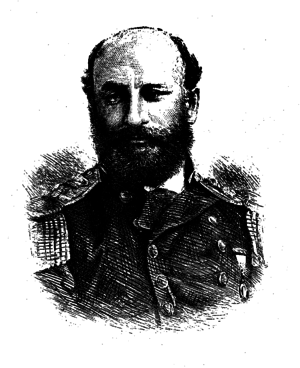George Nares: Difference between revisions
+cat |
GrahamBould (talk | contribs) Added etching of Nares |
||
| Line 1: | Line 1: | ||
[[Image:George Nares.png|thumb|300px|Captain (later Admiral Sir) George Strong Nares.]] |
|||
'''Admiral Sir George Strong Nares, KCB, RN''' ([[April 24]], [[1831]] - [[January 15]], [[1915]]) was a [[United Kingdom|British]] naval officer and [[Arctic]] [[List of explorers|explorer]]. He was the son of another British naval captain, and was educated at the [[Royal Naval College]]. |
'''Admiral Sir George Strong Nares, KCB, RN''' ([[April 24]], [[1831]] - [[January 15]], [[1915]]) was a [[United Kingdom|British]] naval officer and [[Arctic]] [[List of explorers|explorer]]. He was the son of another British naval captain, and was educated at the [[Royal Naval College]]. |
||
Revision as of 20:24, 15 June 2006

Admiral Sir George Strong Nares, KCB, RN (April 24, 1831 - January 15, 1915) was a British naval officer and Arctic explorer. He was the son of another British naval captain, and was educated at the Royal Naval College.
Nares's first experience of the Arctic came while serving as second mate on Resolute, part of Sir Edward Belcher's squadron on his 1852-1854 expedition in search of Sir John Franklin. Later he was given command of the Challenger Expedition (1872-1876), but, because of his previous experience in the Arctic, he was summoned from this assignment to take charge of another Arctic voyage in search of the North Pole in Discovery and Alert in 1875.
On this expedition, Nares became the first explorer to take his ships all the way north through the channel between Greenland and Ellesmere Island -- now named Nares Strait in his honor -- to the Lincoln Sea. Up to this time, it had been a popular theory that this route would lead to the supposed Open Polar Sea, an ice-free region surrounding the pole, but Nares found only a wasteland of ice. A sledging party under Albert Hastings Markham set a new record farthest north of 83° 20', but overall the expedition was a near-disaster. The men suffered badly from scurvy and were hampered by inappropriate clothing and equipment. Realizing that his men could not survive another winter in the ice, Nares hastily retreated southward with both his ships in the summer of 1876.
In addition to Nares Strait, Nares Mountain and Nares Lake, in Yukon, Canada, are named for him.
He also surveyed the Magellan Strait and several locations in Australia.
